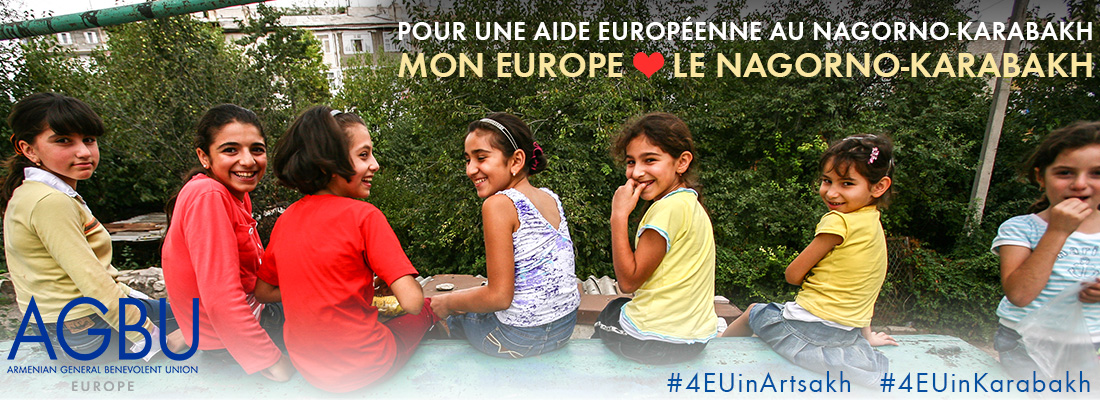Signez la pétition sur change.org
Nous appelons l’Union européenne à établir le contact avec la population du Nagorno-Karabakh et à lui porter assistance.
Le Nagorno-Karabakh est un territoire enclavé du Sud Caucase où vivent 150 000 habitants. C’est l’un des Etats non reconnus qui ont émergé de l’effondrement de l’Union Soviétique et c’est aussi l’une des régions les plus désavantagées d’Europe.
Les habitants de ce territoire sont soumis à un blocus depuis plus de 20 ans. La République d’Azerbaïdjan prétend à la souveraineté sur le Nagorno-Karabakh et s’efforce de l’isoler du reste du monde, ce qui lui cause des difficultés considérables.
Le territoire compte une des plus fortes proportions au monde de victimes de mines antipersonnel. Ces accidents touchent chaque année des civils, principalement des enfants et des paysans. Le Halo Trust est la seule ONG internationale active sur le terrain, mais elle ne reçoit aucun financement européen pour y accomplir sa mission de déminage.
Avec des lignes de front sur la plupart des frontières du Nagorno-Karabakh, où se produisent des accrochages fréquents, la sécurité y est une préoccupation majeure. Des atrocités auraient été commises à l’occasion de combats sur la ligne de front, mais aucune ONG et aucun observateur international ne sont présents pour enquêter et chercher à y établir les faits.
L’Azerbaïdjan, que le pétrole a enrichi, investit des moyens considérables pour décourager les responsables politiques étrangers, les journalistes et les organisations internationales d’entrer au Nagorno-Karabakh. A l’insistance de l’Azerbaïdjan, l’Union Européenne n’y pénètre pas non plus. Aucun représentant de l’UE ne s’y est rendu depuis 20 ans et aucune assistance européenne n’a été fournie à sa population.
Cet isolement du Nagorno-Karabakh est sans équivalent en Europe. L’Union Européenne fournit de l’aide à 150 pays dans le monde. Elle fournit également de l’aide aux populations de plusieurs Etats non reconnus, tels que l’Abkhazie, la Transnistrie et Chypre du Nord, dans le cadre de sa politique d’ « assistance sans reconnaissance ».
Nous appelons l’UE à être présente au Nagorno-Karabakh et à y soutenir des projets destinés à améliorer les conditions de vie de sa population, car les politiques de l’UE devraient contribuer au bien-être, plutôt qu’à la misère des populations en Europe et dans son voisinage.
Nous appelons également l’Europe à être présente au Nagorno-Karabakh car elle doit être présente et contribuer à la paix quand la guerre menace à ses frontières.
Cette pétition est soutenue par plusieurs dizaines de personnalités à travers l’Europe:
Frank Engel, Member of the European Parliament (Luxembourg) – Michèle Rivasi, Member of the European Parliament (France) – Aloys Kabanda, Author, survivor of the genocide of the Tutsi, Ibuka (Belgium) – Bart Staes, Member of the European Parliament (Belgium) – Jill Evans, Member of the European Parliament (United Kingdom) – Peter Niedermüller, Member of the European Parliament (Germany) – Benjamin Abtan, President of the European Grassroots Antiracist Movement – EGAM, Coordinator of the Elie Wiesel Network of Parliamentarians of Europe for the Prevention of Mass Atrocities and Genocides and against Genocide Denial (France) – Josep Maria Terricabras, Member of the European Parliament – (Esquerra Republicana de Catalunya) – Bernard Coulie, Professor and former Dean, the Catholic University of Louvain (Belgium) – Daniyel Demir, President of BDVAD, umbrella organization for Arameans in Germany – Dr Mark Levene, Reader in History at the University of Southampton (United Kingdom) – Dr Ruth Barnett, psychiatrist and writer (United Kingdom) - Dr. Tessa Hofmann, author and chairwoman of the human rights NGO Working Group “Recognition Against Genocide” (Germany) – Francisco Palacios Romeo, Professor of Constitutional Law, Faculty of Law, University of Zaragoza (Spain)- Frank de Boer, Federal Union of European Nationalities (FUEN) (Belgium) – Fredrik Malm, Member of Swedish Parliament, Federal Chairman of the Liberal Party of Sweden, Deputy Chairman of the EU affairs committee, (Sweden) – Hans-Jochen Schmidt, Ambassador, retired (Germany) – Tommaso Nodari, Unrepresented Nations and Peoples’ organization (UNPO) (Belgium) – Harut Grigorian, World champion of kickboxing (Belgium) – Hervé Georgelin, PhD, Lecturer in History, Department of Turkish Studies, National and Capodistrian University of Athens (Greece) – Jose Antonio Gurriarán, Journalist & writer (Spain) – Klas-Göran Karlsson, Professor of history at the Department of History at Lund University (Sweden) – Mher Hovhanisian, Chess champion of Belgium (Belgium) – Iñaki Irazabalbeitia Fernández, former Member of the European Parliament, responsible for international relationships of Aralar political party – Jose María Etxebarria, member of the foreign affairs commission of EAJ-PNV political party – Murad Artin, Member of the City Countil of Örebro, former member of Parliament (Sweden) – Orit Arfa, journalist and author, (Israel & USA) – Pascale Charon, former Secretary General of the European Network Against Racism (Belgium) – Paul Meerts, Senior Research Associate at the Clingendael Institute (Netherlands) – Pedro Santisteve, Mayor of Zaragoza, professor at the Faculty of Law of Zaragoza, lawyer, social activist (Spain) – PhD Andrzej A. Zięba, Historian, Institute of Ethnology and Cultural Anthropology, the Jagiellonian University (Poland) – Prof. Dr. Otto Luchterhandt, Professor of Public Law and Eastern European Law at the University of Hamburg (retired) (Germany) – Ivaylo Mihaylov, tenor (Bulgaria) – Katrin Bornmüller, Honorary Chairwoman of the International Society for Human Rights Germany (German: Internationale Gesellschaft für Menschenrechte, IGFM) – Rafael Larreina Valderrama, former Vice-President and member of the Basque Parliament and former Basque deputy in the Congress of Deputies of the Spanish State – Ricardo Angoso Garcia, journalist, sociologist, political analyst and President of Forum of Ideas for Democracy (Spain & Colombia) – Svante Lundgren, Researcher, Lund University (Sweden) – Todor Petkov Hristev, Lecturer in philosophy at the French Academy of Plovdiv, former co-chairman of Plovdiv City (Bulgaria) – Tony Palmer, Film director (United Kingdom) – Vicent Partal, journalist, founder and manager of VilaWeb, Catalonia – Nikolay Gadjev, CEO, Markogi Ltd, Bulgaria. Francesco Trupia, Researcher in Political Philosophy, Sofia University, Bulgaria &Italy – Andrzej Pisowicz, linguist and retired professor of the Institute of Oriental Philology at the Jagiellonian University (Poland) – Eudald Calvo, Mayor of Argentona, Catalonia – David Bondia, Professor of Public and International relations, Faculty of Law, University of Barcelona and President of the Human Rights Institute of Catalonia (IDHC) – Luis Murillo, Former attorney of the Government of Aragón (Spain) – Åke Daun, Professor emeritus in ethnology, Nordic Museum and Stockholm University (Sweden) – Dr. Christian Kolter, sociologist and economist, Leipzig (Germany) – Harry van Bommel, former Member of Parliament (the Netherlands) – Veselina Gadjeva, Deputy Rector of Scientific and International Activities at “Tracian University” of Stara Zagora (Bulgaria) – Tills Mansmann, Member of the Praesidiu, FDP-Hessen (Germany) – Dieter Werner Schleier, Chairman of the CDU in Ringsheim (Baden-Württemberg, Germany) – Atanas Vladimirov Boiadjiev, Lawyer, Associate Professor in History, Sofia New Bulgarian University (Bulgaria) – Jan Abgarowicz, co-founder, Foundation for Civic Responsibility (Poland) – Joël Kotek, political scientist and historian (Belgium)

